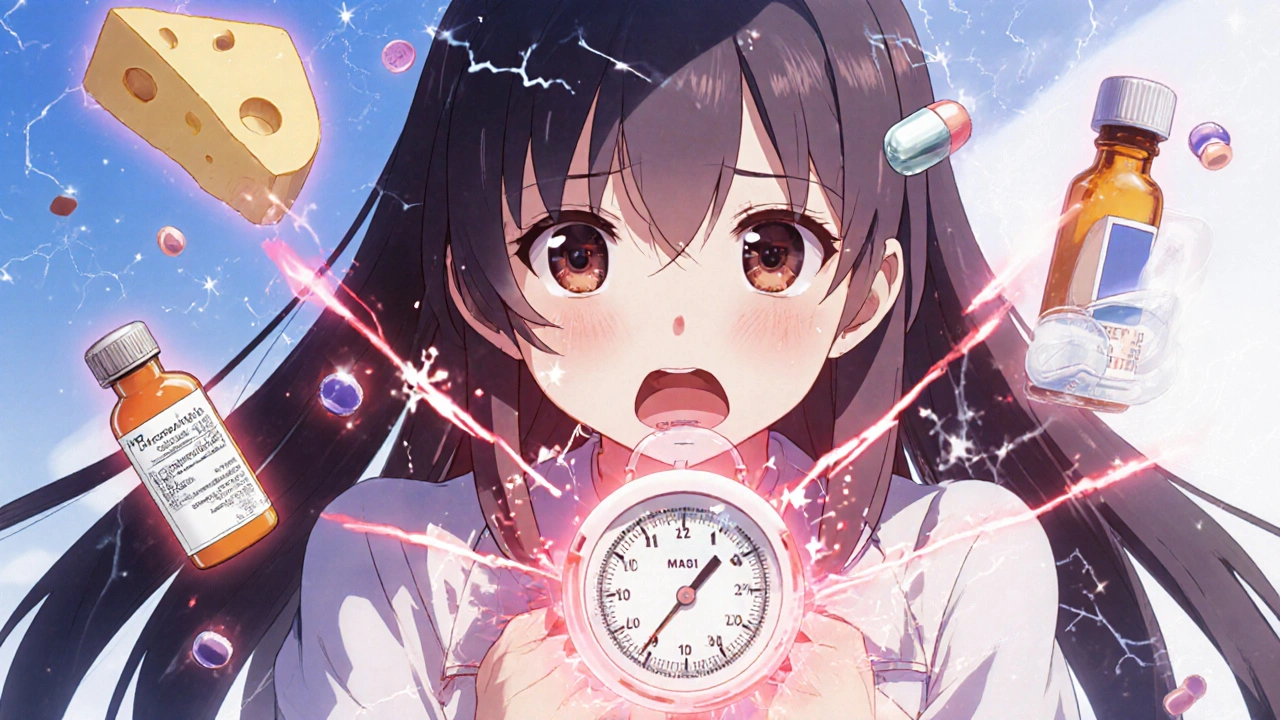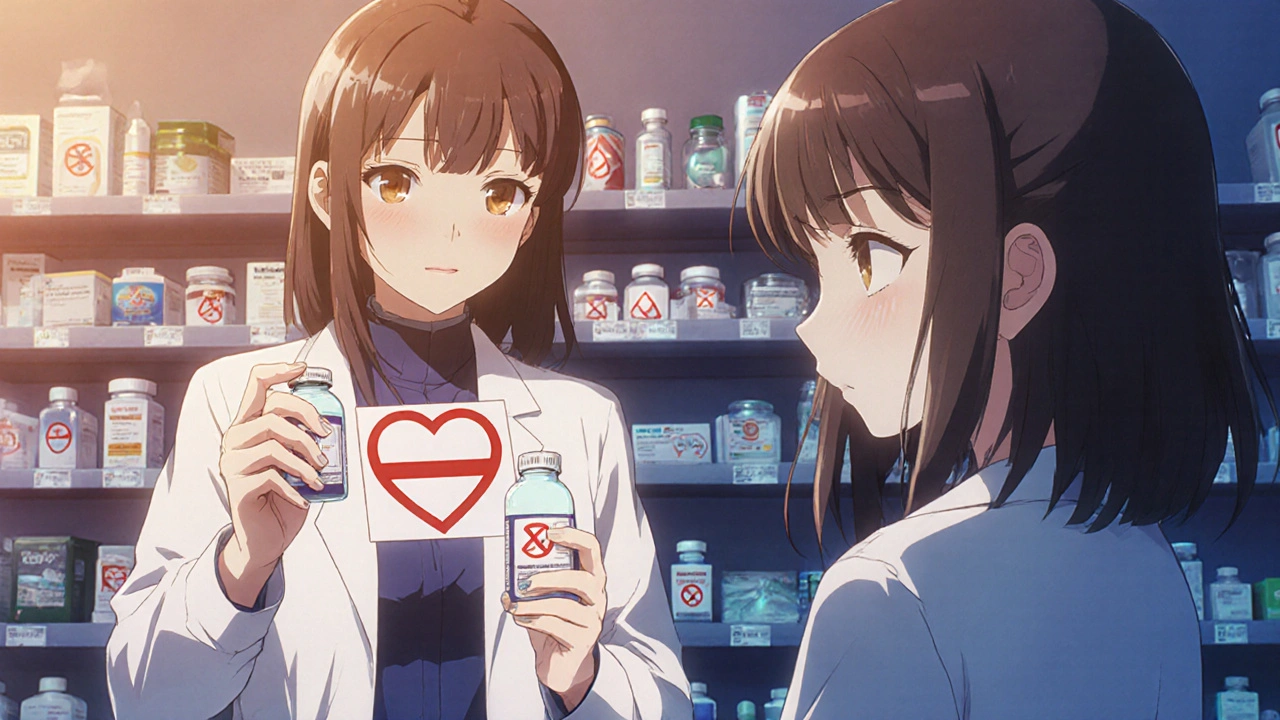Severe Hypertensive Crisis from Drug Interactions and Reactions
 Nov, 12 2025
Nov, 12 2025
Drug Interaction Risk Checker
Check Your Medication Risks
This tool identifies dangerous interactions based on the article's findings. Enter your medications to see if you're at risk for a hypertensive crisis.
What Is a Hypertensive Crisis?
A hypertensive crisis isn’t just high blood pressure-it’s a sudden, dangerous spike that can tear arteries, damage kidneys, or trigger a stroke within minutes. When your systolic pressure hits 180 mmHg or higher, or your diastolic climbs past 120 mmHg, you’re in a medical emergency. This isn’t the slow creep of chronic hypertension. This is your body screaming for help. And one of the most common, yet often missed, triggers? Drug interactions.
How Drugs Trigger a Sudden Blood Pressure Spike
Most people think of high blood pressure as something that builds over years-poor diet, stress, genetics. But sometimes, it explodes overnight because of a simple mix of medications or even a snack you didn’t think twice about. The body’s blood pressure control system is finely tuned. When certain drugs interfere with it, the result can be catastrophic.
Take MAOIs, a class of antidepressants like phenelzine or selegiline. These drugs block an enzyme that breaks down norepinephrine, a natural stimulant. If you eat aged cheese, cured meats, or even draft beer while on an MAOI, tyramine from those foods floods your system. Your body can’t clear it, so norepinephrine surges uncontrollably. Blood pressure can jump 50 to 100 points in under an hour. There are real cases-like one Reddit user who woke up with 220/130 after eating cheddar with his selegiline. He spent three days in the ICU.
Other dangerous combos include stimulants like Adderall or phentermine mixed with antidepressants like venlafaxine. At doses over 300 mg/day, venlafaxine can raise diastolic pressure above 90 mmHg. When paired with a decongestant like pseudoephedrine, the effect multiplies. A 2021 study found that this specific interaction led to 40% more hypertensive emergencies than older antidepressants.
Hidden Culprits: Over-the-Counter and Herbal Triggers
You don’t need a prescription to trigger a crisis. Many people don’t realize that common OTC products can be just as dangerous.
Licorice candy, for example, isn’t just a sweet treat. It contains glycyrrhizin, which blocks the enzyme that protects your body from cortisol acting like a mineralocorticoid. This tricks your kidneys into holding onto salt and water, swelling your blood volume by 10-15%. Systolic pressure can climb 15-20 mmHg over weeks. In one documented case, a 68-year-old man with persistent high blood pressure had normal labs-until his doctor asked if he ate licorice daily. He’d been eating two pieces every morning for years. After quitting, his BP dropped to normal in 14 days.
Decongestants like pseudoephedrine and phenylephrine are another silent threat. They’re in cold and allergy meds. They constrict blood vessels to reduce nasal swelling-but they also constrict every vessel in your body. For someone on an SSRI or beta-blocker, this can cause a sharp, dangerous spike. Consumer Reports found that only 12% of OTC decongestant labels clearly warn about this risk.
Even supplements like St. John’s Wort can interfere with antidepressants, reducing their effectiveness and triggering rebound hypertension. And don’t forget stimulant weight-loss pills. Phentermine, often prescribed with topiramate, can push systolic pressure over 200 mmHg in susceptible patients-especially if combined with caffeine or other stimulants.

Why Doctors Miss These Cases
It’s not that doctors aren’t trained. It’s that they’re overwhelmed. A 2022 study found that 65% of emergency doctors didn’t routinely check a patient’s full medication list during a hypertensive emergency. They saw high BP, assumed it was chronic, and treated the symptom-not the cause.
Another problem? Labeling. The FDA now requires black box warnings on MAOIs-those bold, red alerts you see on prescription bottles. But for most other high-risk drugs, the warnings are buried in tiny print. A 2022 analysis showed 78% of high-risk medications still don’t clearly warn about hypertensive crisis potential, especially when used off-label or with OTC products.
Even worse, some patients are misdiagnosed. In transplant patients on cyclosporine, hypertension is so common that doctors often mistake it for organ rejection. They increase the immunosuppressant dose-making the blood pressure even worse. One European registry found that 55% of these cases were mismanaged this way.
Who’s at Highest Risk?
You’re at greater risk if you:
- Take MAOIs (phenelzine, tranylcypromine, selegiline)
- Use venlafaxine at doses above 225 mg/day
- Take cyclosporine or tacrolimus after a transplant
- Use stimulant weight-loss drugs like phentermine
- Consume large amounts of licorice, aged cheese, or cured meats
- Combine OTC decongestants with antidepressants or blood pressure meds
- Are over 65 and on three or more medications
Genetics also play a role. New research shows that people with certain CYP2D6 gene variants metabolize some antidepressants slower, making them 3.2 times more likely to have a severe reaction. Testing for this is now available-and it’s becoming part of standard care in major hospitals.

What to Do If You Suspect a Crisis
Don’t wait. If your blood pressure suddenly spikes above 180/120 and you have symptoms like severe headache, blurred vision, chest pain, shortness of breath, or confusion-call 911. This is not a “wait and see” situation.
For MAOI-tyramine reactions, the fastest treatment is IV phentolamine. It works in under 20 minutes and has a 92% success rate. Other cases may need labetalol, nitroprusside, or calcium channel blockers like amlodipine, depending on the trigger.
But the real win is prevention. If you’re on any of these high-risk drugs:
- Keep a full list of every medication, supplement, and OTC product you take-including dosages and how often.
- Ask your pharmacist to screen for interactions every time you pick up a new prescription.
- Use apps like ‘MAOI Diet Helper’ to track tyramine-rich foods if you’re on an MAOI.
- Never start a new OTC med without checking with your doctor-especially cold, allergy, or weight-loss products.
- Monitor your BP at home weekly if you’re on venlafaxine, cyclosporine, or stimulants.
The Future: Tech Is Starting to Help
There’s hope. In early 2023, the FDA approved the first AI-powered decision-support tool designed specifically to flag drug interactions that cause hypertensive crisis. In a trial across 12 hospitals, it cut MAOI-related emergencies by 40%. It’s now being rolled out in electronic health records.
The NIH is also testing a system called the ‘Hypertension Interaction Alert System,’ which analyzes over 15,000 known drug interactions with 92% accuracy. It doesn’t just warn about MAOIs and tyramine-it catches obscure combos like bupropion + pseudoephedrine or fluoxetine + licorice.
By 2024, the American College of Cardiology will classify venlafaxine doses above 225 mg/day as “high risk,” requiring quarterly BP checks. More insurers are covering genetic testing for CYP2D6 variants. And prescription monitoring programs have already reduced MAOI-related crises by 28% in states that use them.
Bottom Line: Knowledge Saves Lives
A hypertensive crisis from drug interactions is preventable. It’s not rare. It’s not mysterious. It’s just overlooked. The same person who checks their cholesterol, tracks their steps, and reads food labels might not think to ask if their cold medicine is safe with their antidepressant. But they should.
Medications save lives-but they can also kill if used carelessly. The most dangerous drug isn’t the one you take alone. It’s the one you take with something else. Know your meds. Know your risks. And if something feels wrong-trust your gut. Your blood pressure might be telling you something your doctor hasn’t seen yet.
Can over-the-counter cold medicine cause a hypertensive crisis?
Yes. Decongestants like pseudoephedrine and phenylephrine can cause dangerous spikes in blood pressure, especially when taken with antidepressants (like SSRIs or SNRIs), MAOIs, or blood pressure medications. Even one dose can trigger a crisis in sensitive individuals. Always check with your pharmacist before taking any OTC cold, flu, or allergy medicine if you’re on prescription drugs.
Is it safe to eat cheese if I’m on an MAOI?
No. Aged cheeses (like cheddar, parmesan, blue cheese), cured meats, tap beer, soy sauce, and fermented foods contain tyramine, which can trigger a life-threatening spike in blood pressure when combined with MAOIs. Even small amounts can be dangerous. There’s no safe threshold-avoid these foods entirely while on an MAOI and for at least two weeks after stopping.
How long does it take for blood pressure to return to normal after stopping the offending drug?
It depends on the drug. With MAOIs and tyramine, BP usually drops within hours after stopping the trigger and starting treatment. With licorice or mineralocorticoid-boosting substances, it can take weeks because the body holds onto salt and fluid. Cyclosporine-induced hypertension may take months to fully resolve, even after stopping the drug. Always follow up with your doctor for monitoring.
Can venlafaxine cause high blood pressure even without other drugs?
Yes. Venlafaxine causes dose-dependent increases in blood pressure. At doses above 225 mg/day, about 1 in 5 patients develop diastolic pressure above 90 mmHg. This can happen even without other medications. That’s why doctors now recommend checking blood pressure monthly if you’re on high-dose venlafaxine. If your pressure rises, your doctor may lower your dose or switch you to a different antidepressant.
Are there any safe alternatives to MAOIs for depression?
Yes. SSRIs like sertraline or escitalopram, and SNRIs like duloxetine, have far fewer dietary restrictions and lower risk of hypertensive crisis. Bupropion is another option, though it carries its own BP risks at high doses. The key is working with your doctor to find a medication that treats your depression without creating new dangers. Never stop an MAOI abruptly-this can cause withdrawal symptoms. Always taper under medical supervision.

Alyssa Lopez
November 13, 2025 AT 10:19Alex Ramos
November 14, 2025 AT 04:10edgar popa
November 14, 2025 AT 12:17Eve Miller
November 14, 2025 AT 22:54Chrisna Bronkhorst
November 16, 2025 AT 03:46Amie Wilde
November 16, 2025 AT 15:30Gary Hattis
November 17, 2025 AT 07:56Esperanza Decor
November 17, 2025 AT 13:28Deepa Lakshminarasimhan
November 18, 2025 AT 05:35Erica Cruz
November 18, 2025 AT 08:25